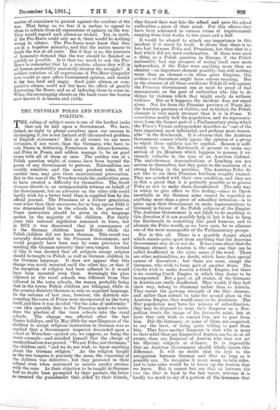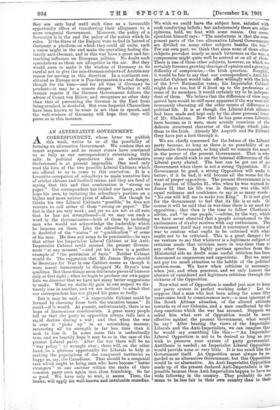THE PRUSSIAN POLES AND EUROPEAN POLITICS. T HE ruling of subject
races is one of the hardest tasks that can be laid upon a Government. We have, indeed, no right to plume ourselves upon our success in discharging it, for is not Ireland still the unsolved problem of English statesmen? But at all events we are more fortunate, if not wiser, than the Germans, who have to rule Danes in Schleswig, Frenchmen in Alsace-Lorraine, and Poles in Posen, and seldom manage to be on good. terms with all of them at once. The sudden rise of a Polish question might, of course, have been beyond the power of any Government to prevent. Nationalities are terribly sensitive, and , the most prudent ruler, if of another race, may give them unintentional provocation. But in the case of the Wreschen trials the authorities seem to have created a difficulty for themselves. The North German Gazette is an unimpeachable witness on behalf of the Government, but an advocate on the other side could hardly wish for a better brief than is supplied him by the official journal. The Prussians of a former generation were wiser than their successors, for as long ago as 1842 it was determined that in the schools in the province of Posen instruction should be given in the language spoken by the majority of the children. For thirty years this rational regulation remained in force, but in 1872 it was discovered that in consequence of it the German children knew Polish while the Polish children did, not know German. This result was naturally distasteful to the Prussian Government, and would properly have been met by some provision for teaching the German minority their own tongue. Instead of this it was decreed that all subjects except religion should be taught to Polish as well as German children in the German language. It does not appear that this change was much resented until the other day, or that if the exception of religion had been adhered to it would have been resented even then. Seemingly the plan followed in the rural schools was different from that followed in the town schools, the reason probably being that in the towns Polish children are bilingual, while in the country districts German is only an acquired language. In the autumn of last year, however, the districts sur- rounding the town of Posen were incorporated in the town itself, and then it was decided "for the sake of uniformity" —an idea specially dear to the Prussian mind—to intro- duce the practice of the town schools into the rural schools. The change was effected after the last Easter holidays, and by May 20th the unwillingness of the children to accept religious instruction in German was so marked that a Government inspector descended upon a school at Wreschen—picked out, we suppose, as being the orst example—and satisfied himself that the charge of insubordination was proved. "We are Poles, not Germans," the children said, "and we do not wish to know anything about the German religion." As the religion taught in the two tongues-is precisely the same, the reasoning of the children was defective ; but they persisted in their refusal even when sentenced to receive sundry strokes with the cane. As their objection to be taught in German had no doubt been prompted by their parents, the latter 80 resented the punishment that, aided by their friends, they forced their way into the school and gave the school authorities a piece of their mind. For this offence they have been sentenced to various terms of imprisonment ranging from four weeks to two years and a half.
It would be absurd to attach any importance to this incident if it stood by itself. It shows that there is no love lost between Poles and Prussians, but then that is a fact which did not need confirmation. If there were such a thing as a Polish question in Europe, if the Polish nationality had. any prospect of seeing itself once more independent, if the Poles were anything more than an element—an important element possibly, but still nothing more than an element—in three great Empires, this evidence of discontent might have serious meaning. But in the absence of all these conditions Polish ill-will against the Prussian Government can at most be proof of bad management on the part of authorities who like to do things by violence which they might easily do without violence. But as it happens, the incident does not stand alone. Not far from the Prussian province of Posen lies the Austrian province of Galicia, and in Galicia the Polish element is very much stronger than it is in Posen. It constitutes nearly half the population, and its representa- tives form the largest part of a Parliamentary group which the Times's Vienna correspondent describes as "one of the best organised, most influential, and perhaps most reason- able" in the Reichsrath. It is obvious that the Austrian Government cannot wholly ignore the opinion of a group to which these epithets can be applied. Reason is suffi- ciently into in the Reichsrath at present to make any section of its Members which happens to possess it ex- tremely valuable in the eyes of an Austrian Cabinet. The anti-German demonstrations at Lemberg are not serious in themselves, but they point to the existence of a strong feeling in the province. The Austrian Poles do not like to see their Prussian brethren roughly treated. They are satisfied with their own condition, and they see in this a proof that it is perfectly possible so to govern Poles as not to make them discontented. The only way in which to give effect to this feeling—since to throw snowballs at the German arms cannot be regarded as anything more than a piece of schoolboy irritation—is to press upon their Government to make representations to Germany in favour of the Polish subjects of the Empire. The Austrian Government is not likely to do anything in this direction if it can possibly help it, but it has to keep the Reichsrath in something like good humour, and to alienate the Poles would, as we have seen, be to alienate one of the most manageable of the Parliamentary groups.
Nor is this all. There is a possible danger ahead which stands quite apart from anything that the Austrian Government may do or not do. It has come about that the German element in Austria is the only one that can be called disaffected in the strict sense of the word. There are other nationalities, no doubt, which have their special causes of discontent ; but there are none, except the Germans, who wish to form part of another State. The Czechs wish to make Austria a Czech Empire, but there is no existing Czech Empire in which they desire to be incorporated. But a part, at all events, of the Germans in Austria are really disaffected. They would, if they had their way, belong to Germany rather than to Austria. They resent the growing strength of the ,Slav element, and rather than submit to take the second place in the Austrian Empire, they would cease to be Austrians. The Slav population may have lax notions of subordination, they may be disposed to treat their Emperor as a Nea- politan treats the image of his favourite saint, but at most they only wish to control him, not to part from him. But the Germans, or some' of them, are suspected, to say the least, of being quite willing to part from him. They have another Emperor in view who is more to their mind than any Emperor of Austria can be, or, at all events, than any Emperor of Austria who does not set his Slavonic subjects at defiance. It is impossible that an Austrian Government should wholly ignore this difference. It will no doubt shut its eyes to the antagonism between German and Slav as long as it possibly can. To recognise it must mean to take sides, and to take sides would be to break up the Austria that we know. But it cannot but see that as between the two' the Slav is loyal in the last resort, whereas it is hardly too much to say of a portion of the Germans that they are only loyal until such time as a favourable opportunity offers of transferring their allegiance to a more congenial Government. Moreover, the policy of a Sovereign is in the end the policy of the nation which he rules. If the Slays of the Empire were to find in hatred of Germany a platform on which they could all unite, such a union might in the end make the prevailing feeling dis- tinctly anti-German, and in this way have a great and far- reaching influence on European politics. No doubt such speculations as these are altogether in the air. But they would seem to make it the wisdom of Germany to be careful not to give the non-German subjects of Austria any reason for moving in this direction. In a continent con- stituted as Europe now is Pan-Germanism is a real danger, though for the time—and for all time if Germany be prudent—it may be a remote danger. Whether it will remain remote if the German Government follows the advice of Count von Billow, and recognises no other duty than that of preventing the German in the East from being crushed, is doubtful. But even Imperial Chancellors have been known to be wiser in act than in speech, and the well-wishers of Germany will hope that they will prove so in this instance.















































 Previous page
Previous page